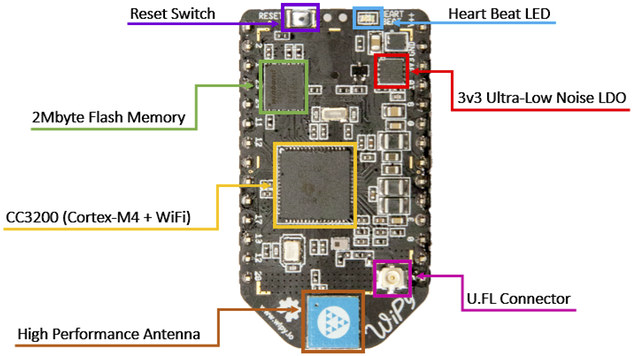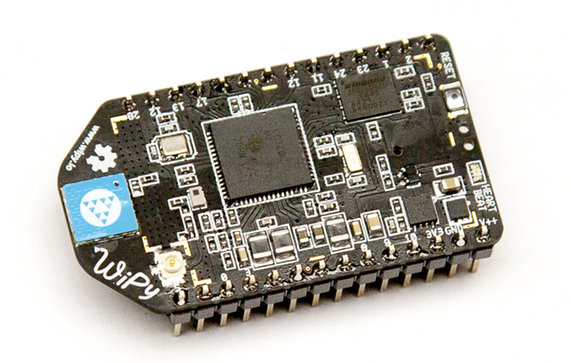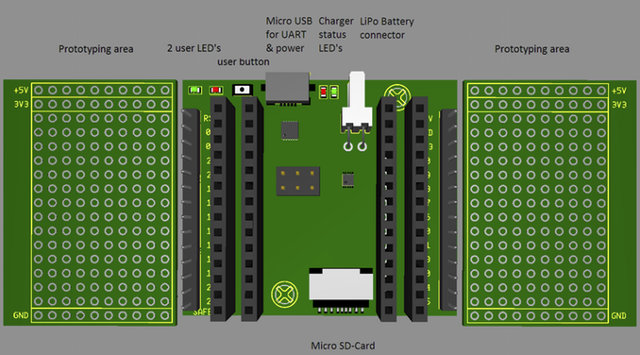If you’ve interested in connecting devices via Wi-Fi, you’re being spoiled as “Internet of things” boards keeps getting designed and produced. The latest board with WiPy, a small board powered by Texas Instruments CC3200, running MicroPython, and consuming less than 1mA in suspended mode with Wi-Fi connected.
- MCU – TI CC3200 ARM Cortex-M4 @ 80 MHz with 256KB RAM, Wi-Fi and TCP/IP stack
- Storage – 2MB flash
- Connectivity – WiFi 802.11b/g/n 16Mbps (AP, Station and WiFi-Direct), on-board antenna and u.FL connector
- Expansion – 2x 14-pin headers (2.54mm pitch) with
- Up to 25 GPIOs
- 2x UART, SPI, I2C, I2S, and SD card
- 3×12 bit ADCs
- Others
- 4×16 bit timers with PWM and input capture
- RTC
- Hash and encryption engines: SHA, MD5, DES, AES
- Reset switch, heartbeat LED
- Power Supply – 3.6 – 5.5V DC input; 3.3V output up to 250mA
- Power Consumption – Active: 14 mA; Suspended (Wi-Fi connected): 850 uA; Hibernating (No Wi-Fi): 5 uA
- Dimensions – 25mm x 45mm (1.0″ x 1.77″)
 Beside low power consumption, the board can switch from suspended to active mode in less than 5 ms, send some data, and go back to sleep, with the developers claiming several years on a single battery charge with this type of activity.
Beside low power consumption, the board can switch from suspended to active mode in less than 5 ms, send some data, and go back to sleep, with the developers claiming several years on a single battery charge with this type of activity.
The board run MicroPython and so it can be programmed using Python 3.4, minus some functions like “with” or “yield from”. You’ll notice no USB port on the board that can be used for programming, that’s because you’d normally connect via Telnet to access the console, and program the board from there, and alternatively you can also connect via FTP to upload Python scripts or other files. WiPy supports BSD sockets, and MicroPython compatible librairies are being worked on to handle HTTP, SMTP, XMPP, FTP, and MQTT, and since the TI MCU also support hardware hash and encryption, secure HTTPS and SSL connection will also be available.

There aren’t any shields for WiPy, as it’s breadboard compatible so you can easily connect it to your existing modules for your project, but they’re still in the process of developing an expansion board with a micro USB and battery connectors, FT234XD USB to serial converter, a LiPo charger, a micro SD socket, two prototyping areas, and more.
MicroPython source code for CC3200 is already available on WiPy github account, and the hardware files are being promised once the project is about to ship.
WiPy has just reached its 30,000 Euros target on Kickstarter, where you can pledge 27 Euros to get WiPy with the headers of your choice (male, female, double stackable, or none), or 37 Euros to also include the expansion board above. Shipping is included, and delivery scheduled for August 2015. You can find more details, ask question on their forums, and soon access tutorials on www.wipy.io.

Jean-Luc started CNX Software in 2010 as a part-time endeavor, before quitting his job as a software engineering manager, and starting to write daily news, and reviews full time later in 2011.
Support CNX Software! Donate via cryptocurrencies, become a Patron on Patreon, or purchase goods on Amazon or Aliexpress






